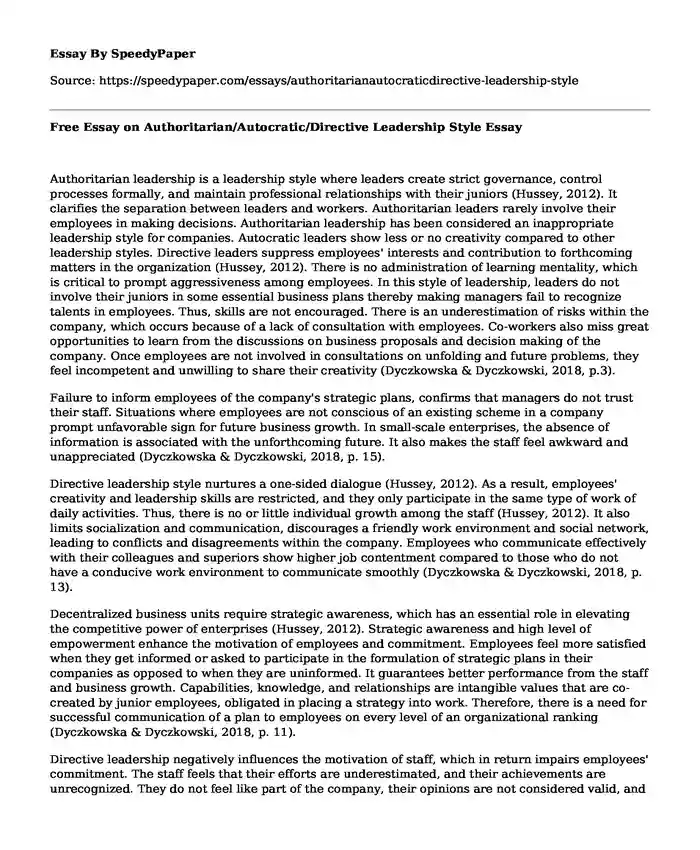
| Type of paper: | Essay |
| Categories: | Leadership style |
| Pages: | 3 |
| Wordcount: | 666 words |
Authoritarian leadership is a leadership style where leaders create strict governance, control processes formally, and maintain professional relationships with their juniors (Hussey, 2012). It clarifies the separation between leaders and workers. Authoritarian leaders rarely involve their employees in making decisions. Authoritarian leadership has been considered an inappropriate leadership style for companies. Autocratic leaders show less or no creativity compared to other leadership styles. Directive leaders suppress employees' interests and contribution to forthcoming matters in the organization (Hussey, 2012). There is no administration of learning mentality, which is critical to prompt aggressiveness among employees. In this style of leadership, leaders do not involve their juniors in some essential business plans thereby making managers fail to recognize talents in employees. Thus, skills are not encouraged. There is an underestimation of risks within the company, which occurs because of a lack of consultation with employees. Co-workers also miss great opportunities to learn from the discussions on business proposals and decision making of the company. Once employees are not involved in consultations on unfolding and future problems, they feel incompetent and unwilling to share their creativity (Dyczkowska & Dyczkowski, 2018, p.3).
Failure to inform employees of the company's strategic plans, confirms that managers do not trust their staff. Situations where employees are not conscious of an existing scheme in a company prompt unfavorable sign for future business growth. In small-scale enterprises, the absence of information is associated with the unforthcoming future. It also makes the staff feel awkward and unappreciated (Dyczkowska & Dyczkowski, 2018, p. 15).
Directive leadership style nurtures a one-sided dialogue (Hussey, 2012). As a result, employees' creativity and leadership skills are restricted, and they only participate in the same type of work of daily activities. Thus, there is no or little individual growth among the staff (Hussey, 2012). It also limits socialization and communication, discourages a friendly work environment and social network, leading to conflicts and disagreements within the company. Employees who communicate effectively with their colleagues and superiors show higher job contentment compared to those who do not have a conducive work environment to communicate smoothly (Dyczkowska & Dyczkowski, 2018, p. 13).
Decentralized business units require strategic awareness, which has an essential role in elevating the competitive power of enterprises (Hussey, 2012). Strategic awareness and high level of empowerment enhance the motivation of employees and commitment. Employees feel more satisfied when they get informed or asked to participate in the formulation of strategic plans in their companies as opposed to when they are uninformed. It guarantees better performance from the staff and business growth. Capabilities, knowledge, and relationships are intangible values that are co-created by junior employees, obligated in placing a strategy into work. Therefore, there is a need for successful communication of a plan to employees on every level of an organizational ranking (Dyczkowska & Dyczkowski, 2018, p. 11).
Directive leadership negatively influences the motivation of staff, which in return impairs employees' commitment. The staff feels that their efforts are underestimated, and their achievements are unrecognized. They do not feel like part of the company, their opinions are not considered valid, and they lack encouragement from their superiors. Even if employees' opinions may oppose and distress the powerful holders of the organization, it is vital to organizational success. It is essential, therefore, to make conditions where the goodness of sharing opinions are not exceeded by the danger which result from a complication of human relations within the company (Dyczkowska & Dyczkowski, 2018, p.13).
Conclusion
The style of leadership has an impact on the overall performance of a company. Authoritarian leadership style hinders employees' performance, commitment, talents, interests, creativity, communication and success rate of an organization. It does not offer equal opportunity for leaders and their subordinates when it comes to the contribution of ideas to the company. Therefore, the success of a business is compromised.
References
Dyczkowska, J., & Dyczkowski, T. (2018). Democratic or Autocratic Leadership Style?
Participative Management and its Links to rewarding Strategies and Job Satisfaction in SMEs. Athens Journal of Business & Economics, 4(2), 193-218. doi: 10.30958/ajbe.4.2.5
Hussey, D. (2012). Strategic Management. Hoboken: Taylor & Francis.
Cite this page
Free Essay on Authoritarian/Autocratic/Directive Leadership Style. (2022, Aug 22). Retrieved from https://speedypaper.net/essays/authoritarianautocraticdirective-leadership-style
Request Removal
If you are the original author of this essay and no longer wish to have it published on the SpeedyPaper website, please click below to request its removal:
- Free Essay Example on Healthy Cities Movement
- Discussion of Public Administration and the Public, Essay Sample
- Essay Example: Meaning and Importance of Strategy
- Paper Example on Evidence-Based Practice in Nursing
- Free Essay on Digital Crime Theories
- Free Essay: Sculpture and Body Politics
- When an Institution Does Not Conform to the Political Issues. Paper Example
Popular categories




